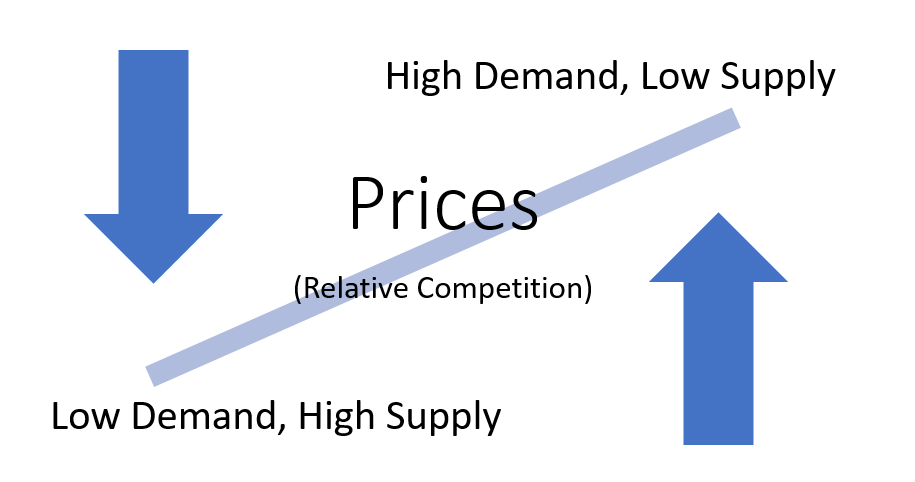Banner artwork by eamesBot / Shutterstock.com
You might greatly improve your quality of life by applying basic economic principles to key choices you make: where to spend your time, what goals to pursue, and how to measure your success.
By understanding how supply and demand (or more simply, competition) applies to much of your life, you can compete more effectively.
By understanding how supply and demand (or more simply, competition) applies to much of your life, you can compete more effectively. You do this by focusing on areas where you have a competitive advantage, which comes from more than your efforts and abilities. It also comes from where you apply your efforts and abilities.
To begin, let's consider a few basic economic principles. We see lots of evidence in the news and public debate that many people don't appreciate these simple rules:
- When demand for goods and services remains constant but supplies are scarce, the prices for those goods and services increases.
- When supplies for goods and services remain steady but demand increases, the prices for those goods and services increases.
- And when demand is high and supplies are short, prices can increase dramatically.
All this is another way of saying that competition for limited resources is real and has an impact on what things cost. When we look at changes in supply and demand, we're effectively measuring how stiff the competition is for the underlying goods and services. The more people who are trying to buy a car, book a flight, or fill their tanks with gas, the more that competition for limited resources will result in prices going up.

The basic rules of competition apply in many areas of life beyond buying goods and services. When there is massive demand but only limited supply, competition will be fierce. This explains why it is hard to get into the top schools, join certain professions, or get jobs in fast-growing companies. This basic rule explains why some salaries are much higher than others, why it's so hard getting elected to political office, and why very few individuals become models, movie stars, or best-selling authors.
Many of us spend most of our time focused on the same things: money, power, fame, possessions. We have been dazzled by the supposed prizes and are blinded to the opportunity costs and likelihood of achieving them. Economics offers another way running the equation to achieve success: look to places where competition is much scarcer (i.e., demand is lower), but where the rewards are still great.
We have been dazzled by the supposed prizes and are blinded to the opportunity costs and likelihood of
achieving them.
At its heart, Stoicism offers such a refuge: little competition for great rewards. These rewards are not the same as others chase. You will not hear a Stoic telling you to pursue a big bank account and a corner office, although these things may come. Instead, set your sights on attaining wisdom and you will be amazed at how wide open the field is. You do not need to compete for scarce resources, because few others are looking for the same goal.
Not only that, but competition on the path to wisdom does not make your task harder. The more people seeking wisdom, the more you can support and benefit each other. Wisdom is one of the few areas in life where greater demand creates greater supply. (A related area we are all familiar with is lawyers, where supply seems to create demand. That is, greater numbers of lawyers typically create more legal issues.)
Set your sights on attaining wisdom and you will be amazed at how wide open the field is.
Best of all, the reward for seeking wisdom is a well-ordered mind following reason. Specifically, with wisdom, you will be satisfied and happy without regard to any of the scarce prizes your colleagues run after. Realizing you do not need money, job titles, or possessions to be happy is incredibly liberating. The question to ask is: Do you want to be successful as it is traditionally understood, or do you want to be happy? The difference lies in whether you seek to attain wisdom.
You see what I did there. You thought you were getting an economics lesson, but instead we used economics as a foothold into a Stoic principle. But my goal with both approaches was the same: to explore ways to live a good life and achieve satisfaction.
Wisdom is one of the few areas in life where greater demand creates greater supply.
I can’t guarantee you’ll become wise if you diligently pursue wisdom as a goal. But the odds are in your favor.
Be well.
Disclaimer: The information in any resource in this website should not be construed as legal advice or as a legal opinion on specific facts, and should not be considered representing the views of its authors, its sponsors, and/or ACC. These resources are not intended as a definitive statement on the subject addressed. Rather, they are intended to serve as a tool providing practical guidance and references for the busy in-house practitioner and other readers.




